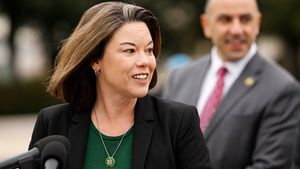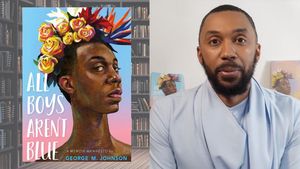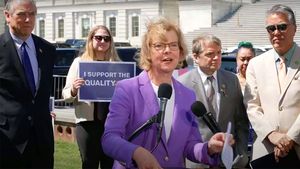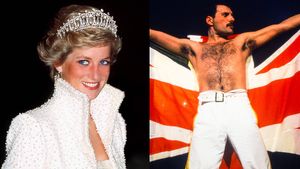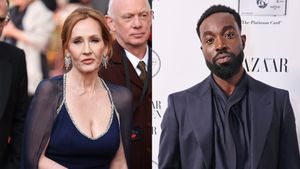Emmy and Tony winner Cynthia Nixon was just 12 when she starred in the summer camp romp Little Darlings, but her role in the gently radical movie was a sign of things to come. The 1980 film stars Kristy McNichol and Tatum O’Neal as teen rivals in a race to lose their virginity before the embers of the final campfire of the summer have been extinguished. Outwardly, Little Darlings was akin to deflowering flicks that featured teen boys, like Porky’s (1981) and the Tom Cruise starrer Losin’ It (1982). Little Darlings, which happened to star three young women who would later come out (Nixon, O’Neal, and McNichol), broke ground by featuring teen girls speaking frankly about sex and desire. And that riled critics in a way that teen boys eager to explore sex hadn’t. The movie set at Camp Little Wolf was a harbinger of Nixon’s career of starring in projects like Sex and the City and And Just Like That…, whichupendthe status quo while celebrating women’s sexual agency and friendship.
“[Little Darlings] was a movie that’s very beloved still, and was very popular, and made a lot of money, but the critics hated it,” Nixon says. “I remember one review that started, ‘Now here’s a disgusting idea for a movie…’”
“‘This is so repulsive that these young girls are talking about sex so frankly and dispassionately, and where’s the love, and where’s the sentiment, and the emotion, and the delicacy, and the, you know, feminine primness?’” she says the critics decried. “[When] Sex and the City premiered a lot of the press was, This is disgusting, these women endlessly bedding all these men, talking about it, dissecting it the next morning after with no discretion, and their hearts don’t seem to be engaged at all.”
“These aren’t really women. These are men disguised as women,” Nixon says was the hackneyed critical refrain.

A stage and screen veteran, Nixon had early roles in David Rabe’s Hurlyburly and the Mike Nichols-directed production of Tom Stoppard’s The Real Thing,playing the daughter of Christine Baranski’s character (40 years later they would play sisters in HBO’s The Gilded Age). In 2006 she won a Tony for Rabbit Hole and another for The Little Foxes in 2017. Following her film debut in Little Darlings, she went on to appear in heavy hitters like Amadeus and Prince of the City. In 2016 she starred as Emily Dickinson in Terrence Davies’ A Quiet Passion. But her most enduring role is that of attorney Miranda Hobbes, the (mostly) pragmatic one of the Sex and the City quartet. Nixon’s journey with Miranda began in 1998 for six initial seasons and continued through two movies and the Max reboot, And Just Like That… (2021).
Of course, Sex and the City was nothing short of a cultural zeitgeist when it premiered. Cosmopolitans and Manolo Blahniks swiftly entered the vernacular. The carnal escapades of Miranda, Carrie (Sarah Jessica Parker), Charlotte (Kristin Davis), and Samantha (Kim Cattrall) drove the series, but their friendship was its heart. There had been shows that featured friendships between women before, like The Mary Tyler Moore Show, but the choice to laud women’s friendships over catfights and jealousy was still a revelation in 1998.
“There are lots of ways of looking at the friendship of the four women. But one way I’ve heard it described that I really enjoy is that these women, all in the pursuit of their many men that they were dating and bedding, were looking for an attachment to a man that was as powerful and durable as the attachment they had to their female friends,” Nixon says.
“I think [Sex and the City] was totally groundbreaking. The reason it so resonated with women out there and with everybody out there is maybe the ‘truth’ that women all want to get married has never been entirely true,” she notes.
Between the original series and And Just Like That…, the TV landscape experienced a seismic cultural shift. For one, there was a boom of queer shows and characters across the small screen. Cable and streamers elevated queerness and women’s friendships in the same breath on The L Word (2004), Orange Is the New Black (2013), and The Bold Type (2017), to name a few. With those strides in LGBTQ+ representation on screen and the fact that Nixon herself is queer, she and And Just Like That… co-creator Michael Patrick King had a brief discussion about Miranda’s evolution.
Nixon says King asked, “‘Do you want to be gay? Do you not want to be gay?’”
She replied, “‘We’re trying to update and integrate this show in every way. And we’re talking about including queer characters, and you have [this] homegrown queer character [meaning Nixon herself], why not just let her go there.’” And just like that, Miranda was on her way to a world of queer discovery.
And Just Like That… has ushered in a new era of queerness for the Sex and the City universe that is more robust with LGBTQ+ people than the show’s gay best friends of the late ‘90s and early aughts. Charlotte’s hilariously acerbic best friend Anthony (Mario Cantone) is back with a cadre of buff gay bread delivery boys and Charlotte’s child Rock is coming into their gender identity. Once it was established that Miranda would “go there” with her sexual evolution after decades of a comfortable marriage to Steve (David Eigenberg), Nixon and King had conversations about who would shake up Miranda’s world.
“[Miranda] and Steve have had this great thing over the years — ups and downs. Miranda was always sort of commitment-phobic and sort of maternal- and domestic-phobic. Steve got in there and got all those things to happen by sort of tiptoeing around,” Nixon says. “[Now] she’s at a point in her life where she doesn’t want someone who’s going to accommodate her. She wants somebody who’s going to challenge her.”
Enter nonbinary stand-up comic and podcaster Che Diaz, played by queer and nonbinary Grey’s Anatomy alum Sara Ramirez. Beyond the immediate relationship, Nixon liked the idea that Che was also Carrie’s boss. She thought it would add a new dynamic to Miranda and Carrie’s relationship. Indeed, a scene in which Miranda and Che have sex for the first time in Carrie’s kitchen (while Miranda is ostensibly caring for Carrie while she recuperates from hip surgery) threw their friendship into a tailspin. Beyond Miranda’s orgasm — unleashed amid luxury kitchen appliances while Carrie inadvertently looked on in disbelief — the scene was the subject of social media posts and stories for days to come. It had legs, so to speak.

But the Miranda/Che relationship is more than fireworks by the fridge. A fan of Ramirez’s since their Tony-winning turn in Spamalot (2005), which happened to be directed by Mike Nichols (whose seal of approval Nixon says she trusted implicitly), Nixon sings Ramirez’s praises.
“[Ramirez] is like a quadruple threat. Never mind [just] the singing and the dancing but the incredible acting chops. I don’t think there’s anybody out there like them. I bug them all the time about when they’re going to come back to the Broadway stage,” Nixon says, adding that her new romantic screen partner is “formidable.”
Sparks fly when Che and Miranda occupy the same space, and the first season finale saw Miranda choosing to follow Che and her heart to Los Angeles. Still, Nixon warns that these two strong personalities are in for some bumps.
“I’m [Miranda] a person with a lot of appetites and interests, and I’m not going to be confined in a box. I’ve been married for a long time. And the last thing I want to do is get married to somebody else. Freedom sounds great,” Nixon says. “What we’ll see in the upcoming season is the ways in which that’s challenging for both of them.”
Queer characters have increased exponentially since Sex and the City entered the culture 25 years ago, and Nixon has contributed to that visibility. She’s starred in queer roles as Dickinson in A Quiet Passion and opposite Sarah Paulson in Ryan Murphy’s Hitchcockian fever dream, Ratched. But like so many fans of And Just Like That…, Nixon craves queer images on screen.
“I love seeing shows with gay characters and particularly lesbian characters. It doesn’t even have to be great. A solid B+, I’ll be like, ‘That was fantastic,’” Nixon says. “There really is no substitute for seeing yourself reflected back at you. And we are all experts in taking characters that are not like us and doing a transference and translating them into our lives. But getting to see queer people and queer stories with a real authenticity to them is very important for me.”
And Just Like That… season 2 debuts June 22 on Max. This article is part of the Out July/August issue, out on newsstands July 4. Support queer media and subscribe -- or download the issue through Amazon, Kindle, Nook, or Apple News.










